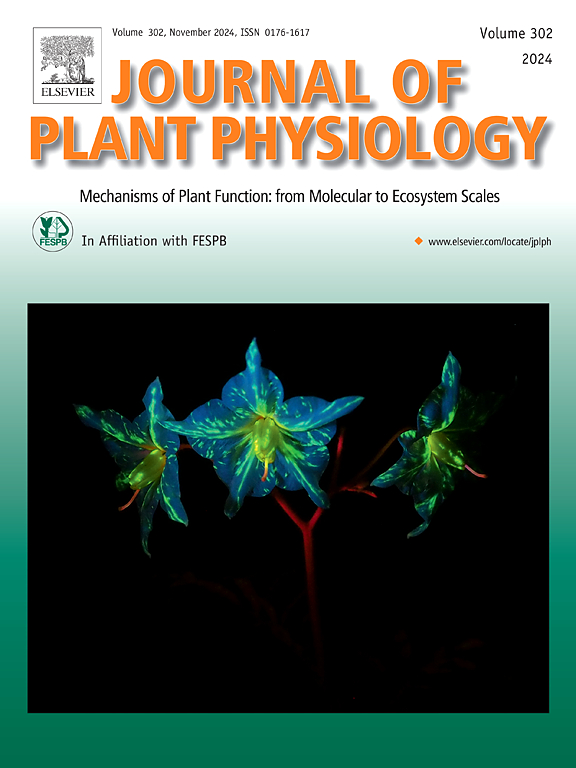烟草植物中组成活性AtCPK1突变体的过表达可能通过调节脱落酸和水杨酸信号传导而具有耐寒性和耐热性。
IF 4
3区 生物学
Q1 PLANT SCIENCES
引用次数: 0
摘要
钙依赖性蛋白激酶(CDPKs)由于其独特的结构是非常有效的钙信号解码器,它通过磷酸化介导底物特异性[Ca2+]细胞信号传导。然而,Ca2+依赖性使得CDPKs的研究具有挑战性。本研究的重点是AtCPK1基因的天然形式和修饰形式的过表达对烟草植物耐热性和耐寒性的影响。我们研究了不同温度下钙与脱落酸(ABA)信号系统的相互作用。研究了激素状态、应激性衰老及相关重要基因的表达。我们发现,AtCPK1修饰的本构活性形式的自抑制结构域失活不仅对长期低温抗性有积极作用,而且对高温抗性也有积极作用。我们发现,在非胁迫条件下,AtCPK1的组成活性形式激活了ABA的生物合成,但在热暴露下检测到ABA含量下降。根据我们的结果,我们可以假设这种效果是通过cpk依赖性水杨酸(SA)信号的激活来实现的。获得的数据揭示了热相关的分子过程,并支持使用CDPK的域内修饰来全面研究其功能特征和作为生物工程工具的可能性。本文章由计算机程序翻译,如有差异,请以英文原文为准。
Overexpression of the constitutively-active AtCPK1 mutant in tobacco plants confers cold and heat tolerance, possibly through modulating abscisic acid and salicylic acid signalling
Calcium-dependent protein kinases (CDPKs) are very effective calcium signal decoders due to their unique structure, which mediates substrate-specific [Ca2+]cyt signalling through phosphorylation. However, Ca2+-dependence makes it challenging to study CDPKs. This work focused on the effects of the overexpression of native and modified forms of the AtCPK1 gene on the tolerance of tobacco plants to heat and cold. We studied the interaction between the calcium and signalling systems of abscisic acid (ABA) at various temperatures. The hormonal state, stress-induced senescence, and expression of important corresponding genes were investigated. We showed that inactivation of the autoinhibitory domain of the modified constitutively active form of AtCPK1 has a positive effect on resistance not only to long-term cold but also to heat. We showed that the constitutively active form of AtCPK1 under nonstressed conditions activated biosynthesis of ABA, but a decrease in ABA content was detected upon heat exposure. On the basis of our results, we can assume that this effect is achieved through the CPK-dependent activation of salicylic acid (SA) signalling. The obtained data shed light on heat-associated molecular processes and support the possibility of using intradomain modifications of CDPK both for comprehensive study of its functional features and as a bioengineering tool.
求助全文
通过发布文献求助,成功后即可免费获取论文全文。
去求助
来源期刊

Journal of plant physiology
生物-植物科学
CiteScore
7.20
自引率
4.70%
发文量
196
审稿时长
32 days
期刊介绍:
The Journal of Plant Physiology is a broad-spectrum journal that welcomes high-quality submissions in all major areas of plant physiology, including plant biochemistry, functional biotechnology, computational and synthetic plant biology, growth and development, photosynthesis and respiration, transport and translocation, plant-microbe interactions, biotic and abiotic stress. Studies are welcome at all levels of integration ranging from molecules and cells to organisms and their environments and are expected to use state-of-the-art methodologies. Pure gene expression studies are not within the focus of our journal. To be considered for publication, papers must significantly contribute to the mechanistic understanding of physiological processes, and not be merely descriptive, or confirmatory of previous results. We encourage the submission of papers that explore the physiology of non-model as well as accepted model species and those that bridge basic and applied research. For instance, studies on agricultural plants that show new physiological mechanisms to improve agricultural efficiency are welcome. Studies performed under uncontrolled situations (e.g. field conditions) not providing mechanistic insight will not be considered for publication.
The Journal of Plant Physiology publishes several types of articles: Original Research Articles, Reviews, Perspectives Articles, and Short Communications. Reviews and Perspectives will be solicited by the Editors; unsolicited reviews are also welcome but only from authors with a strong track record in the field of the review. Original research papers comprise the majority of published contributions.
 求助内容:
求助内容: 应助结果提醒方式:
应助结果提醒方式:


